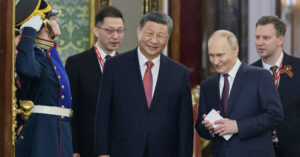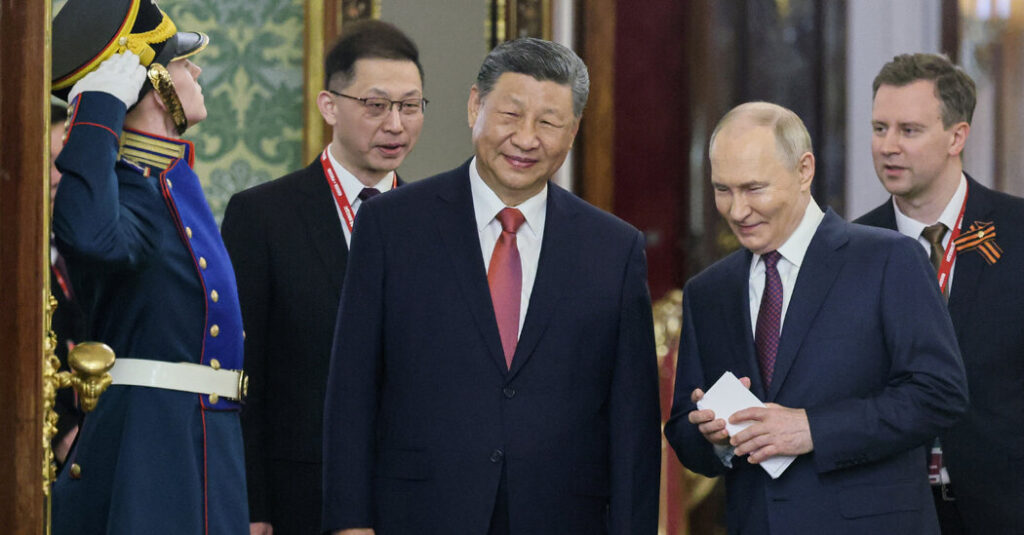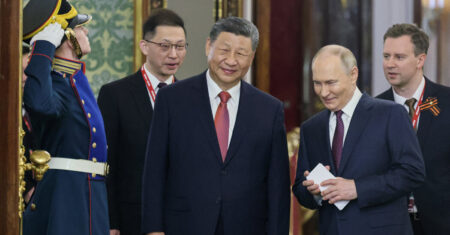President Vladimir V. Putin of Russia and Xi Jinping, the leader of China, presented their countries as guardians of stability and historical memory on Thursday, at a meeting in Moscow a day before celebrations to mark the 80th anniversary of the Soviet victory over Nazi Germany in World War II.
The leaders made public remarks ahead of talks in the Kremlin, part of a separate state visit that Moscow has organized for Mr. Xi, its most important partner. The Chinese leader will also attend a military parade in Red Square on Friday.
Both Mr. Putin and Mr. Xi are having to deal with the unpredictability of President Trump — the Russian president in talks over Ukraine and the Chinese leader in a bruising trade war. Each has sought to present their countries as alternative world powers looking to bring about what they call a more equal, multipolar world.
Mr. Trump had employed some of the same nationalist grievance politics and disinformation strategies that Mr. Putin and Mr. Xi have used to cement their power at home, but has failed to reach a deal with either leader since returning to the White House. Talks with Moscow over the war in Ukraine have not curbed the fighting and U.S. officials are set to begin trade negotiations in Switzerland this week with their Chinese counterparts.
In Moscow, the summit took place as Mr. Putin was set to welcome what the Kremlin expects to be more than 25 world leaders to the Red Square celebrations. The guests include a veritable “Who’s Who” of authoritarians, with the presidents of Venezuela, Cuba, Equatorial Guinea and Belarus expected to attend.
But none of the leaders is more important to Moscow than Mr. Xi.
Russia’s isolation from the West over its full-scale invasion of Ukraine has dramatically increased Moscow’s dependence on Beijing. China has supported Mr. Putin’s war effort by buying Russian oil, supplying dual-use components for Russian equipment and replacing departed Western brands with Chinese consumer goods. Beijing, however, has stopped short of overt military intervention or support.
Mr. Xi described relations between China and Russia today as “more calm, confident, stable and resilient” in his opening remarks at the Kremlin.
He cast the two leaders as defenders of a fair and just world order. And he evoked their countries’ sacrifices during World War II as a symbol of their strength today to push back against “unilateralism and bullying by powerful countries,” an unmistakable reference to the United States and its trade war against China.
The Soviet Union lost some 27 million people during the war, making the memory of the conflict one of the most powerful and emotional forces in Russian life.
Mr. Putin has manipulated that memory to energize his troops, falsely accusing President Volodymyr Zelensky of Ukraine, who is Jewish, of reviving Nazism. Russian forces fighting in Ukraine have been told they must make sacrifices like their forebears did during World War II to once again rid the world of a fascist threat.
“The victory over fascism, achieved at the cost of enormous sacrifices, is of timeless importance,” Mr. Putin told Mr. Xi ahead of their talks.
Mr. Putin said that Russia and China “firmly stand guard over historical truth” and “protect the memory of the events of the war years.” The two countries, he said, “oppose modern manifestations of neo-Nazism and militarism,” a clear reference by the Russian leader to his crusade against Ukraine and its Western backers.
Moscow’s celebration of the Soviet Union’s victory over Nazi Germany comes more than three years after Mr. Putin launched his full-scale invasion of Ukraine and reordered Russian society with a level of repression, militarism and control over official narratives unseen since the days of the Soviet Union.
Zixu Wang contributed research from Hong Kong.



